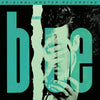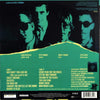



Elvis Costello & The Attractions - Almost Blue (Ultra Analog, Half-speed Mastering)
ORDER LIMITED TO ONE ITEM PER CUSTOMER
Elvis Costello – vocals, guitar
The Attractions
Steve Nieve – piano, organ
Bruce Thomas – bass
Pete Thomas – drums
John McFee – lead guitar, pedal steel guitar
Tommy Millar - violin
Nashville Edition - backing vocals
1 LP, standard sleeve
Limited numbered edition
Original analog Master tape : YES
Half-speed Mastering
Gain 2™ Ultra Analog
Heavy Press : 180g
Record color : black
Speed : 33RPM
Size : 12”
Stereo
Studio
Record Press : RTI
Label : MOFI
Original Label : F-Beat
Recorded in May 1981 at CBS Studios, Nashville
Engineered by Ron 'Snake' Reynolds*
Produced by Billy Sherrill
Remastered by Krieg Wunderlich
Originally released in 1981
Reissued in 2012
Tracks:
Side A :
- Why Don't You Love Me (Like You Used To Do)?
- Sweet Dreams
- Success
- I'm Your Toy
- Tonight The Bottle Let Me Down
- Brown to Blue
Side B :
- Good Year For the Roses
- Sittin' and Thinkin'
- Colour of the Blues
- Too Far Gone
- Honey Hush
- How Much I Lied
Reviews :
"Elvis Costello's "country record" is usually written off as a vanity project, but Almost Blue is quite a bit more than that. It's one of the most entertaining cover records in rock & roll, simply because of its enthusiasm. The album begins with a roaring version of Hank Williams' "Why Don't You Love Me" and doesn't stop. Costello sings with conviction on the tear-jerking ballads, as well as on barn burners like "Tonight the Bottle Let Me Down." It's clear that Costello knows this music, and it's also clear who he learned it from: Gram Parsons. Costello covers Parsons' "Hot Burrito No. 1" and "How Much I Lied," and all of the music on Almost Blue recalls Parsons' taste for hardcore honky tonk and weepy ballads. It's to Costello's credit that he made a record relying on emotion to pay tribute." AllMusic Review by Stephen Thomas Erlewine
Ultra Analog™ : The GAIN 2 Ultra Analog™ Series stems from the use of the Gain 2 system, mastered at half speed from the original master tapes where possible, capturing and uncovering as before undiscovered sonic information.
Half-speed mastering. In half-speed mastering, the whole process is slowed down to half of the original speed. A typical 33 1/3 rpm record is cut at 16 2/3 rpm. The source material is also slowed down (reducing the pitch in the process) meaning the final record will still sound normal when played back. Slowing the whole process down allows more time, which means the end result sounds better and is more efficient — allowing engineering to minimize the effects of inherent limitations within the vinyl format. The result is a more accurate and more open high-frequency response in the half speed vinyl when compared with a normal speed recording.
Ratings :
AllMusic : 4 / 5 , Discogs : 3,83 / 5




